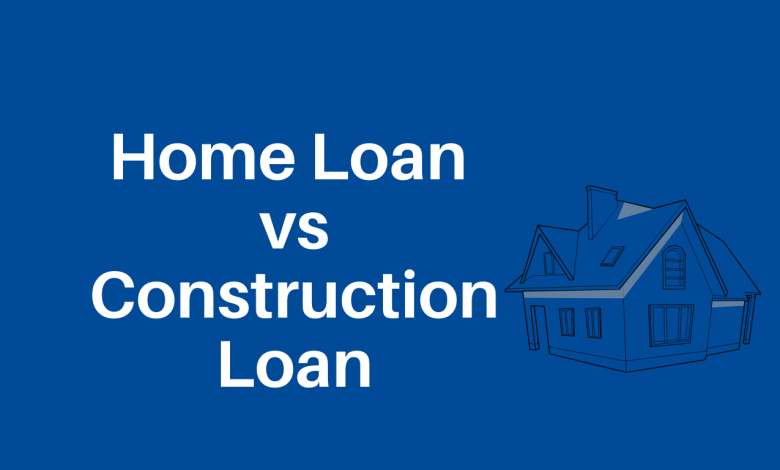Home Loan vs Construction Loan: Differences

A person’s or a family’s own home is one of their numerous ambitions and desires. Applying for a loan to purchase your home is one approach to realize this ambition. However, you have two alternatives for financing.
The first is the more frequent home loan, in which the lender bank lends money to buy an already-built property. A home construction loan, on the other hand, is a sort of loan issued by a lender for the construction of a home even before it is built.
Home loans vs construction loans
Housing loans are available from banks and housing financing firms. Whether you want to buy a ready-to-move-in flat, an under-construction property, build a home on a plot of land, or renovate your current home, you can find the correct housing loan for you. Most borrowers, however, are confused about the difference between a home loan and a home construction loan. Although the two appear to be identical, there are a few differences that consumers should consider when selecting the right home loan.
Home loan
A housing loan is a type of loan that can be used to buy either a ready-to-move-in residence or a property that is still being built by a builder. Borrowers are usually notified about building deadlines and possession schedules by the builder. In addition, most builders have relationships with banks and HFCs and can assist lenders in obtaining home loan financing. This is a property where the borrowers are not required to conduct any construction or remodeling work themselves.
Home construction loan
You can get a home construction loan if you have a plot of land and want to develop a cottage, villa, or even a multi-story building. This type of loan is typically a short-term loan that you can apply for to cover the costs of building a home on your plot of land. This sort of loan is only disbursed during the construction phase, and lenders evaluate the completion of property construction at different intervals to guarantee that the funds are only used for building.
While housing and construction loans appear to be similar at first look, there are substantial differences between them. So, let’s have a look at the key differences between a home loan and a construction loan.
Application process
The application process for a housing loan is the first distinction between the two types of loans. A regular home loan in India requires the borrower to provide only a few basic documents, including property documents for verification. If you want to build a house on a plot, you’ll need to submit the plot’s legal permission documents, as well as the fundamental documents and property documents, to the Municipal Corporation or local authority. Along with the property-tax filing documentation, you must also include an architect’s plan or construction map of the design. As can be seen, obtaining a home construction loan is more complicated than obtaining a regular loan.
Interest rate
When comparing home loans and construction loans, keep the interest rate in mind. To begin, keep in mind that not all lenders provide home construction loans. As a result, the few lenders who do will charge you a higher home loan interest rate. A basic housing loan can be obtained at interest rates ranging from 8% to 10%, however home construction loans can easily cost an additional 1.5 percent to 2%.
Tenure of the loan
The loan tenure is vital to consider because housing loans are high-value loans with high-amount EMIs. Lower EMIs are associated with longer loan terms, and vice versa. Regular home loans have 20-30 year payback terms, whereas home construction loans have 7-15 year repayment terms.
Loan disbursal
When comparing a housing loan against a home construction loan, this is another key issue to consider. Regular home loans should be disbursed within seven working days. Your builder’s account could be instantly credited by the lender. The total loan amount is paid all at once. Home construction loans, on the other hand, are best disbursed in three to five installments, depending on the extent of the construction. Lenders have the ability to suspend or delay payments if construction comes to a halt or if they suspect the funds are not being used for construction when they visit the property at regular intervals.
Types of home construction loans
Self construction loan
A self-construction loan is available if you have purchased or currently own a land and require finances to build a home.
Plot + construction loan
If you don’t already own a plot but need money to buy one and build a house on it, a Plot + Construction loan is the ideal option. Please keep in mind that if you only need money to buy a plot of land and not to build a house, you’ll need to apply for a loan against property or a personal loan, since a home construction loan will not be approved.
Home renovation loan
If you need money to build an extra floor or add a new room to your existing house, you can get a house extension loan. A home remodeling loan can also be used to carry out major repairs, repaint your property, or simply give your house a new look.
How to get a home construction loan
The better your credit score, the more likely you are to get approved for a loan. Your credit score represents your creditworthiness because it keeps track of all the loans you’ve taken/applied for in the past, as well as your repayment history and payment defaults (if any). As a result, ensure that your payment history is clean, as each missed payment can affect your credit score.
Apply for home construction finance based on your credentials. The lender will determine your loan eligibility based on your income and repayment ability. Your monthly EMI should not exceed 50% of your monthly income. Determine your loan eligibility and EMI before applying for a house loan.
Keep your real estate documents and building budget close to hand. The lender will need a thorough understanding of the property, including the size of the house, the construction resources to be used, and the name and contact information for the contractor who will be working on the project.
For the construction of your home, work with reputable contractors. This will give the lender more confidence in you, which will work in your advantage when your application is approved.
Allow for unexpected expenses. In your quest to create your own home, there may be some unexpected charges. Some raw materials, such as steel, cement, or sand, may increase in price during the construction phase. As a result, you must assure the bank that you have the funds to manage the situation.






